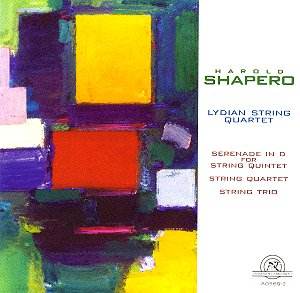AVAILABILITY
www.newworldrecords.org
Born
in Massachusetts in 1920 Shapero proved
a gifted youth, studying with Nicolas
Slonimsky and Ernst Křenek and
with Walter Piston at Harvard from 1937-41.
The roll call of musicians who influenced
him during this period either through
direct tutelage of some kind – Hindemith,
Boulanger – or indirectly such as Stravinsky
- is a prestigious one and it’s clear
that his compositional precocity was
matched by commensurate talent. If we
need proof it comes in the form of these
three early chamber works, all of which
pre-date the work by which he is best
known, the Symphony for Classical Orchestra.
It was after that success that Shapero
ran into critical disapproval – some
of it from compositional colleagues
who found fault with his supposedly
backward-leaning tendencies, amongst
other charges. The ascendancy of serialism
also arrested wider appreciation of
his own music-making and he suffered
a period of grievous neglect only partially
ended by André Previn’s Los Angeles
revival of the Symphony in 1986.
The
Serenade is the composer’s own Quintet
arrangement of the "bigger"
work for String Orchestra. This five-movement
work has real richness of imagination,
from the elegant but withdrawn language
of the Adagio opening to the light and
breezy neo-classicism (but sounding
newly clothed) of the Allegro section
of the first movement. His minuet is
witty and precise with a rather folk-like
trio section with ragtime hints and
gorgeously timed running pizzicati.
If the Larghetto summons up Mozartian
shades one can justly say that model
has been absorbed – this is no pastiche
– and illuminated afresh with precision
and delicate rhythm. The whole Quintet
shares the light and aerated textures
of these movements – let’s hear the
full ensemble version as soon as possible.
The
1941 Quartet was dedicated to Piston
whilst Shapero was still his student.
It’s a work of avowed neo-classicist
intent taken here at warm and flowing
tempi. In its rhythmic confidence it
does bear Piston’s influence but there
is a beautifully coloured lyricism in
the opening movement and a swinging
snap to the rhythmic profile that gives
the second real drive – though there
are moments of lyrical intensity especially
for the lower strings. The third movement
opens with some arrestingly stern unison
writing but it soon lightens before
hinting at a fugato section that never
appears and instead settles on a march
like theme. The finale is cast in sonata-form
wave-like surges and very exciting.
The
programme runs reverse chronologically
so that in our end is our beginning.
We end with the 1937 String Trio, written
when Shapero was just seventeen. In
three concise movements and lasting
eleven minutes this is a work animated
by clear and singing lines despite the
occasionally provocative writing. Lines
break down and are re-started whilst
maintaining continuity. Shapero’s explicit
utilisation of the tone row in the second
movement is accompanied by a questing
melancholy for the solo strings – and
this is a work that very much bears
the practical approach to serialist
procedure that Křenek was then
spending so much time propagating; to
good effect I might add. The finale
by contrast is brisk and acerbic and
also, lest I give a wrong impression
of the music, playful. Shapero may be
complex, even in these early works,
but never portentous.
The
notes are by David Cleary – well argued
and full of musicological and biographical
detail. The performances are spirited,
colourful and rhythmically acute as
well as technically splendid – they
sound thoroughly well prepared and are
admirable advocates for these early
works by an unfairly neglected composer
of unquestionable status.
Jonathan
Woolf
